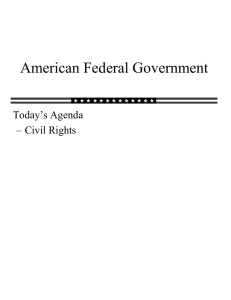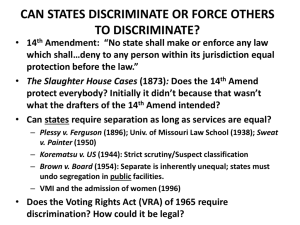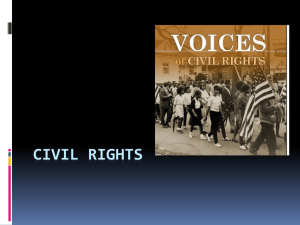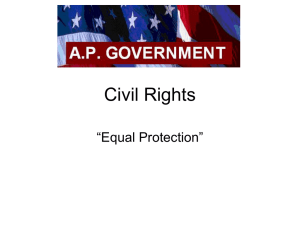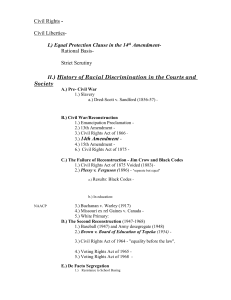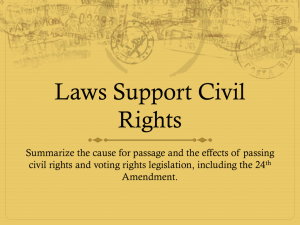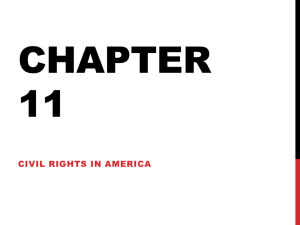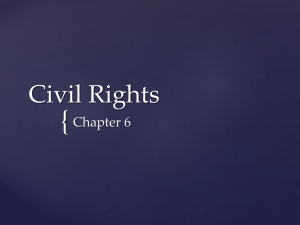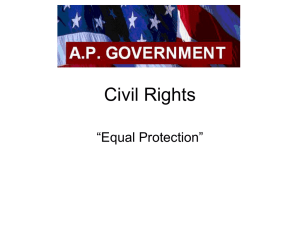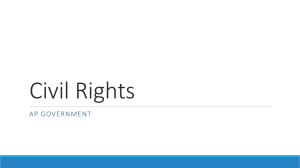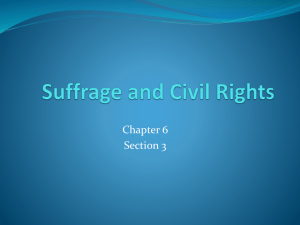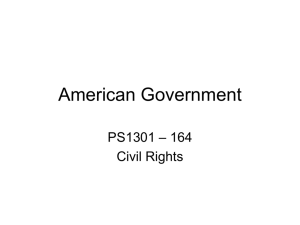Civil Rights
advertisement
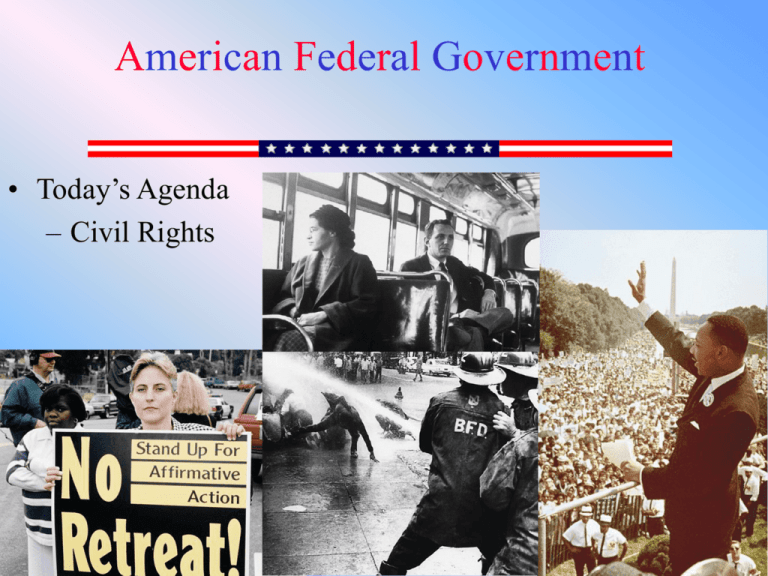
American Federal Government • Today’s Agenda – Civil Rights Sometimes Government Isn’t the Problem • Civil Rights – legal or moral claims that citizens are entitled to make upon government • Question: Should government attempt to ensure equality of opportunity or equality of outcome? • Current issues: – affirmative action – protections for various groups from discrimination (minorities, women, gays/lesbians) That’s it, I’m dropping this course with all the court cases • The Fourteenth Amendment, “Equal Protection of the Laws,” and the Post-Civil War Struggle for African-Americans – – – – – The Slaugtherhouse Cases (1873) U.S. v. Reese (1876) De jure segregation Plessy v. Ferguson (1896) The “black codes,” Jim Crow laws, impediments to voting, separate schools • white primaries, poll taxes, literacy tests, political parties considered “clubs” You should of at least heard of this case • Desegregation in Education – Brown v. Board of Education (1954) – Brown v. Board of Education II (1955) – Little Rock, 1957 • Busing and de facto v. de jure segregation – Swann v. Charlotte-Mecklenburg County Schools (1971) – Milliken v. Bradley (1974) Notice it wasn’t the Hippies that accomplished any of this • The Civil Rights Movement, 1960s – Martin Luther King and civil disobedience – President Lyndon Johnson & “Great Society” • The Civil Rights Act of 1964 • 24th Amendment (1964) • Economic Opportunity Act (1964) • Voting Rights Act (1965) • Fair Housing Act (1968) Civil Rights/ Affirmative Action • Definition of Affirmative Action: – government policies or programs that seek to redress past injustices against specified groups by making special efforts to provide members of the groups with access to educational and employment opportunities – temporary measures vs. institutionalized programs? – greater inclusion or increased “group” conflict? – “reverse” discrimination? Civil Rights/Affirmative Action Views on University Admissions 80 75 Percent 60 60 40 40 25 20 0 Preferential Treatment Extra Effort Oppose Favor Source: James Kuklinski et al., American Journal of Political Science, 1997, pp. 402-419. Schools enjoy court • Higher Education – Regents of the University of California v. Bakke (1978) – Grove City College v. Bell (1984) – Civil Rights Restoration Act (1988) – Hopwood v. Texas (1996) – California Proposition 209 – President Clinton: “Mend it, don’t end it” Employers like Courts too • Employment and other issues • Richmond v. Croson (1989) • Adarand v. Pena (1995) – Employment • Johnson v. Transportation Agency of Santa Clara County (1987) • Civil Rights Act of 1991 • Piscataway v. Taxman (1997) Women dig the black robe…that’s why they go to court • Women – Voting • Minor v. Happersett (1875) • 19th Amendment (1920) – Sex-based discrimination • Equal Rights Amendment • U.S. v. Virginia (1996) [Virginia Military Institute] Gays and Lesbians like all types of courts • Gays and Lesbians – Bowers v. Hardwick (1986) – Clinton’s “Don’t Ask, Don’t Tell” policy in the military – Romer v. Evans (1996) – The Defense of Marriage Act (1996) – Lawrence v. Texas (2003) Everyone goes to court • Voting Rights – Voting Rights Act (1965) – racial gerrymandering & “descriptive representation” – Shaw v. Reno (1993) • North Carolina’s 12th District: The I-85 Corridor Gerrymander…then Gerrymandering…now • North Carolina’s 12th District
